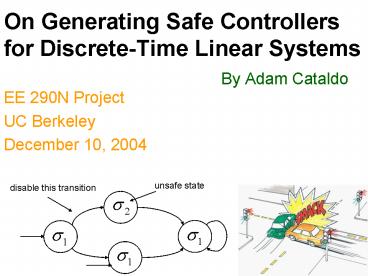On Generating Safe Controllers for DiscreteTime Linear Systems - PowerPoint PPT Presentation
1 / 16
Title:
On Generating Safe Controllers for DiscreteTime Linear Systems
Description:
Linear Temporal Logic ... We can use linear temporal logic express these properties ... f to make x satisfy a safety property. Cataldo 14. Discrete-Time Systems ... – PowerPoint PPT presentation
Number of Views:36
Avg rating:3.0/5.0
Title: On Generating Safe Controllers for DiscreteTime Linear Systems
1
On Generating Safe Controllers for Discrete-Time
Linear Systems
- By Adam Cataldo
EE 290N Project UC Berkeley December 10, 2004
unsafe state
disable this transition
2
Talk Outline
- Research Question
- Background
- Transition Systems
- Discrete-Time Systems
- Relation Between Models of Computation
- Future Directions/Conclusions
3
The Question
- For what discrete-time linear systems can I
compute a controller which will guarantee a
safety constraint? - Safety constraint specified as a linear temporal
logic constraint over the state space - I must have a method to compute the desired
controller or know that no such controller exits
4
Transition SystemsA Concurrent Model of
Computation
- The set of tags is T 0, 1, 2,
5
Behavior
- Initialized runs
- Language (Behavior)
6
Fixed-Point Computation of the Language
- Computing the set of all initialized runs
- F is monotonic and
- Knowing the set of all initialized runs gives us
the language
7
Composing Transition Systems
8
Simulation
- If there are simulation relations from P2 to P1
and P1 to P2, then P1 and P2 are bisimilar and
L(P1) L(P2)
9
Linear Temporal Logic
- Given a set of predicates P over the set of
values, we are interested in enforcing certain
time-dependent safety properties - Example w always satisfies predicate p
- We can use linear temporal logic express these
properties - When we have finite number of states, we can
compute a controller whose composition with our
system enforces these constraints
10
A Discrete-Time, Real-ValuedConcurrent Model of
Computation
- This is actually a special class of
discrete-time, real-valued systems (LTI)
11
Feedback Composition
- Feedback composition holds if (I BH) and (I
FD) are invertible
12
Feedback Composition
- Equivalent system
- We can start with initial values to compute
fixed-point behavior
13
Another Feedback Composition
- The following feedback system also makes a valid
composition
- Our problem is to design f to make x satisfy a
safety property
14
Discrete-Time Systemsas Transition Systems
- We will be interested in the case where V is
finite
15
A Nice Result (Tabuada, Pappas)
V is a finite partition of W
16
A Nice Result (Tabuada, Pappas)
- There exists a bisimilar transition system to P
with a finite number of states - We can compute c by first computing a controller
for the finite-state system































